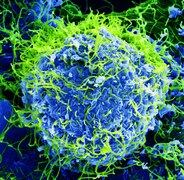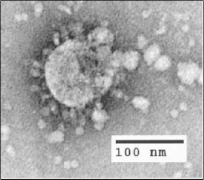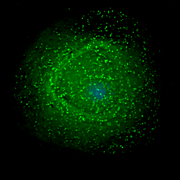Spillover (book)
 First edition | |
| Author | David Quammen |
|---|---|
| Language | English |
| Subject | Epidemiology, viruses, pandemics |
| Published | 2012 |
| Publisher | W.W. Norton & Company |
| Publication place | United States |
| Pages | 592 p |
| ISBN | 978-0-393-06680-7 |
| Website | davidquammen |
Spillover: Animal Infections and the Next Human Pandemic is 2012 non-fiction book by David Quammen. The book, written in narrative form, tells through the personal experiences of the author, who interviewed numerous pathologists and virologists globally to trace the evolution of some of the major pathogens that have affected the human species following a species leap (spillover), a natural process by which an animal pathogen evolves and becomes able to infect, reproduce and transmit within the human species, in a process called zoonosis. Spillover received positive reviews.
Synopsis
In the various chapters of the book, the author dwells on the analysis of a specific pathogen, starting from its discovery and studies on it: the Hendra virus in the first chapter; the Ebola virus in the second; the mathematical study of epidemics at the same time as the spread of malaria in the third; SARS in the fourth; bacterial zoonosis in the fifth chapter (Q fever, psittacosis and Lyme disease); the study of viral transmissibility from animal to man with the case study of herpes B in monkeys and hepadnaviruses from bats in the sixth and seventh chapters; HIV in the eighth chapter and finally some considerations on the evolution of epidemics in relation to the contribution that human activities have in the spread of zoonosis.
Among the human activities, the author identifies some criticisms that increasingly favor the spread of epidemics, including deforestation and the destruction of natural habitats that increase contacts between wild animal species and man, pollution, the overpopulation of some areas that brings millions of people into contact in relatively very confined spaces, the possibility of ever faster and cheaper air travel that favor the possibility of spreading diseases in distant places, and the intensive in contact with billions of animals with the consequent risk of animal epidemics that can be transmitted to humans. All these factors, therefore, in different ways favor the spread of diseases and increase the chances of new future spillovers with pathogens still unknown to the human species but present in nature, just waiting for the right "opportunity" to "make the leap" in humans.
“Spillover” is less public health warning than ecological affirmation: these crossovers force us to uphold “the old Darwinian truth (the darkest of his truths, well known and persistently forgotten) that humanity is a kind of animal” — with a shared fate on the planet. “People and gorillas, horses and duikers and pigs, monkeys and chimps and bats and viruses,” Quammen writes. “We’re all in this together.”
— Breeding Ground, Sonia Shah's review of the book for The New York Times
Viruses and pathogens discussed in the book
- Chapter 1: Hendra virus
- Chapter 2: Ebola virus
- Chapter 3: Malaria
- Chapter 4: SARS
- Chapter 5: Bacterial zoonosis - Q fever, psittacosis, and Lyme disease
- Chapter 6: Herpes B
- Chapter 7: Nipah virus
- Chapter 8: HIV
- Chapter 9: Nuclear Polyhedrosis Virus
-
Hendra virus
-
Ebola virus
-
Malaria parasite connecting to a red blood cell
-
Electron micrograph of SARS coronavirus virion
-
C. burnetii, the Q fever-causing agent
-
Direct fluorescent antibody stain of a mouse brain impression smear showing C. psittaci
-
Borrelia burgdorferi the causative agent of Lyme disease (borreliosis) magnified 400 times
-
TEM micrograph showing Hepatitis B virus virions
-
HIV assembling on the surface of an infected macrophage. The HIV virions have been marked with a green fluorescent tag
-
Electron micrograph of the rod-shaped particles of tobacco mosaic virus
Reception
Spillover received positive reviews upon its release. Kirkus awarded a star review, praising the accounts on "the thrill of the chase and the derring-do of field research", and described it as "wonderful and eye-opening."[1] Alice Roberts from The Guardian also recommended the book, and praised the recounts on the viruses, the "fascinating" historical details, and the combination of field research with virology, epidemiology and genetics[2] Sonia Shah from The New York Times called it "meaty" and "sprawling", complimenting the descriptions of field trips, and considered the author to be a "cheeky and incisive chronicler of the scientific method".[3] David Williams from Seattle Times also commented positively on the "page turning" engagement, the author highlighting the evolution of zoological diseases and coverage of epidemiologists researching the origins of diseases.[4]
Awards
- The Science and Society Book Award, given by the National Association of Science Writers (2013)[5]
- The Society of Biology (UK) Book Award in General Biology (2013)[6]
- Andrew Carnegie Medals for Excellence in Fiction and Nonfiction (2013)[7]
References
- ^ SPILLOVER | Kirkus Reviews.
- ^ "Spillover: Animal Infections and the Next Human Pandemic by David Quammen – review". the Guardian. 2012-11-11. Retrieved 2022-07-05.
- ^ Shah, Sonia (2012-10-19). "Breeding Ground". The New York Times. ISSN 0362-4331. Retrieved 2022-07-05.
- ^ Williams, David B. (2012-09-30). "'Spillover': Deadly diseases that jump from animals to humans". The Seattle Times. Retrieved 2022-07-05.
- ^ "ScienceWriters2013 Awards Gala celebrates science journalism". National Association of Science Writers.
- ^ "2013 Book Awards Winners". Royal Society of Biology.
- ^ "ALA AWARDSGRANTS". American Library Association.
External links
- 'Spillover: Animal Infections and the Next Human Pandemic' Reviewed by Abdul-Kareem Ahmed at NCBI
- ""Spillover: The Next Human Pandemic" - Hangout with Author David Quammen". YouTube. Scientific American. May 6, 2014.
- "Scientific American Talk. David Quammen: The Spillover of Animal Infections to Humans (interview by Steve Mirsky, podcast with transcript)". Scientific American podcast, Science Talks. November 18, 2012.
- Presentation by Quammen on Spillover, October 12, 2012, C-SPAN









